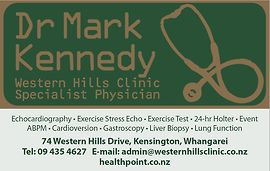Northland > Private Hospitals & Specialists >
Dr Mark Kennedy - Private Internal Medicine Specialist
Private Service, Internal Medicine, Cardiology, Gastroenterology & Hepatology (Liver), Respiratory
Electrocardiogram (ECG)
Patient information:
An ECG (Electrocardiogram) tracing is a recording of your heart's electrical activity that can be read by your doctor. It is a quick, easy, painless test that records the electrical signals generated by the heart with each heart beat. Electrode patches are attached to your skin over your chest and limbs to measure the electrical impulses given off by your heart. An ECG may be performed as a routine screening test (e.g. before surgery) or in people complaining of problems such as chest pain, palpitations, high blood pressure, or shortness of breath. It can provide important information about the heart rhythm, a previous heart attack, thickness of the heart muscle, heart chamber enlargement or strain, inadequate oxygen delivery to the heart, or problems with the conduction of electrical signals through the heart.
The ECG procedure:
Cardiac signals are detected by multiple electrodes (sticky pads), placed on the chest and limbs, and transcribed onto paper by the ECG machine. The procedure takes approximately 5 - 10 minutes.
After the test:
Dr Kennedy will interpret the ECG. It is important to note that a normal ECG does not exclude heart disease, and further testing may be necessary. Depending on your history, examination and ECG findings, you may go on to have other investigations such as echocardiography or some form of cardiac exercise testing.

